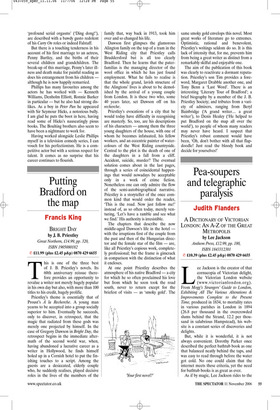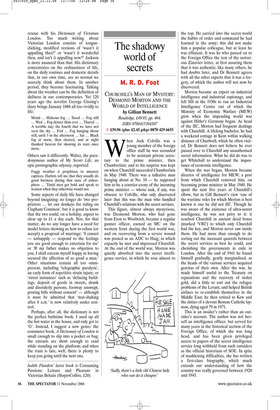Pea-soupers and telegraphic paralysis
Judith Flanders
A DICTIONARY OF VICTORIAN LONDON: AN A-Z OF THE GREAT METROPOLIS by Lee Jackson Anthem Press, £12.99, pp. 180, ISBN 1843312301 ✆ £10.39 (plus £2.45 p&p) 0870 429 6655 Lee Jackson is the creator of that cornucopia of Victorian delight, the Victorian London website (www.victorianlondon.org). From Mogg’s Strangers’ Guide to London, Exhibiting All The Various Alterations & Improvements Complete to the Present Time, produced in 1834, to mortality rates in various parishes in London in 1894 (26.8 per thousand in the overcrowded slums behind the Strand, 12.2 per thousand in salubrious Hampstead), his website is a constant series of discoveries and delights.
But, while it is wonderful, it is not always convenient. Dorothy Parker once described the perfect bathtub book as one that balanced neatly behind the taps, and was easy to read through before the water got cold. No one could claim that the internet meets these criteria, yet the need for bathtub books is as great as ever.
As if by magic, Lee Jackson rides to the rescue with his Dictionary of Victorian London. Too much writing about Victorian London consists of tongueclicking, modified versions of ‘wasn’t it appalling then?’ or ‘wasn’t it wonderful then, and isn’t it appalling now?’ Jackson is more nuanced than that. His dictionary concentrates on the ordinariness of life, on the daily routines and domestic details that, in our own time, are so normal we scarcely think about them. In another period, they become fascinating. Talking about the weather can be the definition of dullness in our contemporaries. Yet 120 years ago the novelist George Gissing’s diary brings January 1888 all too vividly to life:
Mond ... Hideous fog ... Tuesd ... Fog still ... Wed ... Fog denser than ever ... Thursd ... A terrible day; the fourth that we have not seen the sky ... Frid ... Fog hanging about still, until 3 in the afternoon ... Sat ... Black fog at noon, then cleared, and at night thanked heaven for showing its stars once more.
Others saw it differently. Walter, the pseudonymous author of My Secret Life, an epic pornographic odyssey, reported:
Foggy weather is propitious to amatory caprices. Harlots tell me that they usually do good business during that state of atmosphere ... Timid men get bold and speak to women when they otherwise would not.
Some aspects of daily life have changed beyond imagining: no longer do ‘two proprietors ... let out donkeys for riding on Clapham Common’, but it is good to know that the two could, on a holiday, expect to clear up to £1 a day each. Nor, for that matter, do we any longer have a need for model letters showing us how to refuse (or accept) a proposal of marriage: ‘I cannot — unhappily — respond to the feelings you are good enough to entertain for me’ or ‘If my father makes no objection to you, I shall esteem myself happy in having secured the affection of so good a man.’ Other situations remain all too omnipresent, including ‘telegraphic paralysis’, an early form of repetitive strain injury; or ‘street nuisances’ such as ‘defacing buildings, deposit of goods in streets, drunk and disorderly persons, footway unswept, posting bills without consent’ — although it must be admitted that ‘mat-shaking after 8 a.m.’ is now relatively under control.
Perhaps, after all, the dictionary is not the perfect bathtime book. I used up all the hot water in the house, and only got to ‘G’. Instead, I suggest a new genre: the commuter book. A Dictionary of London is small enough to slip into a pocket or bag; the extracts are short enough to read while standing on the platform; and when the train is late, well, there is plenty to keep you going until the next one.



































































































 Previous page
Previous page